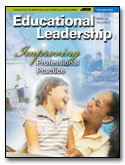March 1, 2006
•
5 min (est.)•
Vol. 63•
No. 6All About Accountability / Needed: A Dose of Assessment Literacy
What most of today's educators know about education assessment would fit comfortably inside a kindergartner's half-filled milk carton. This is astonishing in light of the fact that during the last 25 years, educator competence has been increasingly determined by student performance on various large-scale examinations. Government agencies typically administer these exams, unapologetically aiming them at appraising educators' effectiveness. Yet most teachers and administrators are unfamiliar with how such large-scale tests are put together or polished. A profession's adequacy is being judged on the basis of tools that the profession's members don't understand.
This situation is analogous to asking doctors and nurses to do their jobs without knowing how to interpret patient charts. Because health professionals are evaluated according to the longevity and physical well-being of their patients, you can be certain that those professionals thoroughly understand how to ascertain a patient's vital signs. They're calledvital signs because they're vital!
Yet hoards of educators carry out their day-to-day work as though education testing were somehow peripheral to their mission. It isn't. Today, more than ever, education assessment plays a pivotal role in the education of students. That's why educators—and everyone else who has an interest in education—need a dose of assessment literacy.
It is, of course, understandable why so many of today's educators are uninformed about education measurement. What most teachers and administrators know about education testing harks back to those days when, as students themselves, they were on the receiving end of classroom and standardized tests. The few educators who actually do take a formal course in education assessment often find the course's content to be quantitatively intimidating and instructionally irrelevant. Although typically labelededucation assessment, many graduate courses in measurement have precious little to do with the realities of education.
When I refer to assessment literacy, I'm not thinking about a large collection of abstruse notions unrelated to the day-to-day decisions that educators face. On the contrary, assessment-literate educators need to understand a relatively small number of commonsense measurement fundamentals, not a stack of psychometric exotica.
Let me illustrate by correcting a misconception that oodles of educators hold about education measurement, that there's such a thing as a valid test. Tests aren't valid or invalid. Rather, test-basedinferences are valid or invalid. Teachers test their students to arrive at inferences (that is, interpretations) about those students' covert skills or knowledge. We can't determine a child's ability to read merely by looking at the child—even using a magnifying glass—because a youngster's reading skill is unobservable. Accordingly, we ask the student to take a reading test, and we then use his or her performance on the test to arrive at an inference regarding the student's covert reading skill.
Why, you might ask, is it important for educators to know that validity is a property of a test-based inference rather than of a test? Well, if a teacher mistakenly believes that validity resides in the test itself, the teacher will be inclined to defer to whatever results the “valid test” produces. Assessment-literate educators, however, understand that education tests merely provide evidence that enables people to make judgmentally based inferences about students. And most of us know, from far too many personal foul-ups, that people's judgments are frequently flawed.
If educators thoroughly understood a dozen measurement fundamentals, they could knowledgeably deal—as professionals—with the key assessment-related issues that seem to make today's education world spin. For example, teachers should know how to determine the accuracy of students' scores on particular standardized tests and how to excise the assessment bias that sometimes creeps into teacher-made tests. As assessment literacy promulgators, measurement-knowledgeable educators could spread the word. The truth is, we need piles of such promulgators.
How does an educator who knows little about assessment master these measurement basics? Fortunately, there are a number of practical, easy-to-read books about education assessment that have been published in recent years. Colleges and universities are also offering more and more education assessment courses that focus on the real-world assessment needs of both novice and experienced teachers. Fortunately, educators can master what they need to know about assessment much more rapidly than most people think.
For assessment-literate educators to behave as true professionals, however, they need to undertake purposeful promulgation efforts—with four audiences in mind. First, they need to address educators themselves. They should initiate a promulgation polka in their own backyard by pushing for the installation of assessment-related professional development programs. Next, they need to inform parents of school-age kids about what education tests can and can't do, perhaps by preparing for parents brief take-home explanations of key assessment concepts, such as the characteristics of a reliable test. Third, everyday citizens—and especially key policymakers—need an infusion of assessment literacy, dispensed in a way that makes sense to laypeople. Letters to newspaper editors and appearances on radio talk shows can help here. Finally, because test scores so vitally affect today's students, why not let students in on what makes education tests tick? A two-day instructional unit dealing with testing issues from a student's perspective would be one way to pull this off. Promulgators of assessment literacy can reach out to these audiences through their professional associations, individually, or as part of an ad hoc promulgation coven.
This is a sincere plea. We are members of a profession currently buffeted by a test-based tornado that too few of our members understand. We must get a sufficient number of our colleagues to learn more about the rudiments of education assessment and, having done so, communicate what they've learned. What we need, in short, is to propagate the promulgators. And we need to do it sans delay.
